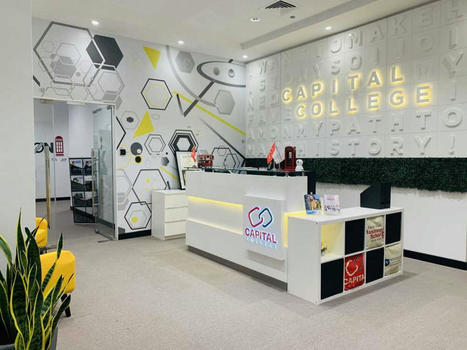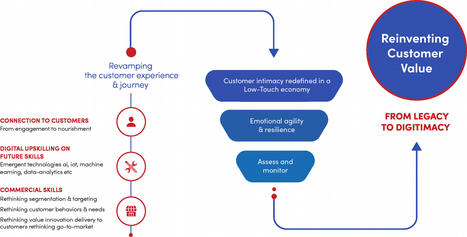 Your new post is loading...
 Your new post is loading...
Three policies to make it a reality.
SEO or search engine optimization is a whole science that has been created to fine-tune websites into making them more visible to search algorithms. The visibility of the website is critical for a ...
Dr. Vikas Nand Kumar Batheja, the Co-Founder and Director of Capital College, speaks about how edtech is changing the landscape of the education sector for better What sort of edtech learning was learned during the COVID-19 pandemic? Certainly, this is an overwhelming time for all educators, students, and families. However, only times like these help us evolve and bring out our creative side to innovate, curate, and deliver through tech-based learning tools that will retain the quality of education. Capital College tries adhering to effective pedagogical practices so that they remain engaged and interested in the learning material. One of the ways we have adopted these practices is by producing well-designed interactive lessons that are supported with constant checking to meet the needs of the learners. It is done by creating compelling audio and video content for students to remain interested and engaged. While traditionally, schools give generic files where students are expected to learn and understand by themselves, currently, we are seeing a rise in learning software like LMS. At Capital College, we have worked on both – synchronous and asynchronous learning formats depending on what best suits the student’s learning process. We have a range of live sessions, recorded lectures where we target a global classroom making the session highly interactive and interesting. What sort of impact has the pandemic had on the education sector in the region? Like every industry, the pandemic has led to a stage of uncertainty in the education sector as well. There has been a significant portion of disruption in the system where research suggests that more than 1.6 billion learners spread across 190 countries and continents are globally affected. With higher education institutions taking a digital route, it has projected to affect 94% of the student population. Having said that, this is a testing time and as responsible educators, we are looking for techniques that will salvage the current situation and perhaps discover ways that will be highly beneficial in the near future. In fact, with the aid of technology, there has been a display of a promising future in the industry with an expedited mode of delivering quality education. Yes, many students may not have the required resources to carry forward an online mode of learning, however, this is a start to creating a safe environment where adaptive and well-read learners will thrive. Has digital technology in education enabled us to find new answers? Yes, definitely. Digital technology has evolved to become a core element in the education system. While tech tools have not only helped students to remain engaged and interested, but it has also formed an effective interactive space where it is no longer JUST textbook material. In addition to this, the role of teachers has also changed post the incorporation of digital technology. They are no longer just orators or professionals who are imparting wisdom to the students, but they have transformed to become content creators, mentors, advisors, and evaluators. With teaching materials empowered with artificial intelligence, we are also starting to build platforms that can gauge student response and work accordingly. Apart from this, these systems can integrate the type of tasks, interests, and difficulties so that teachers can tackle them. Such tools are only going to add a significant level of precision which may be difficult to achieve in a traditional classroom setting. How effective is digital technology in education? We strongly believe that digital technology is nothing but bringing out the best in students. Digital learning tools are enabling students to cultivate self-directed learning skills. Students can identify the learning material, understand the importance of it and they are successfully able to apply the information. In some cases, they are also able to evaluate their performance. On a higher education level, this will increase their efficiency, productivity, and ultimately will make them job-ready. Through this form of learning, they can sharpen their critical reasoning and analytical skills which are reflected positively on their logic, imagination, and creativity as opposed to traditional textbook learning. Additionally, technology creates an effective visual appeal which is keeping students engaged, growing their .k, knowledge base without them even realising it. They are becoming active learners, listeners, and adaptors which is further reinstated with teamwork, storytelling, problem-solving, and gamification. With students becoming more responsible and accountable for their actions, they will be able to venture as self-starters in the market which is very crucial considering the current climate. As young aspirers, if they have the ability to become entrepreneurs and ideally create jobs for others, it is an achievement in itself for the education system. Even before COVID-19, was there already high growth and adoption in education technology? The concept of e-learning is not new. It has been prevalent for a few decades, however, the intensity of its adaptation has changed rapidly. Even before the pandemic, global EdTech investments were reaching $18.66 billion in 2019 and were set to reach $350 billion by 2025. Since the coronavirus outbreak, there has been a surge in using online tools like online learning software, portals to submit papers and assignments, video conferencing for teaching purposes, or even language apps. Over the years, EdTech has had a constant source of enhancing education techniques, innovations and this pandemic has only reaffirmed its importance in the sector. The technology advancement has not only retained the quality of education provided but also improved student experience. What are the challenges in adopting the latest technologies into the education sector today? One of the biggest challenges in the education sector is that many students do not possess reliable internet access or other technical difficulties that disable them from active classroom participation. This is highly relevant in countries with lower income brackets. For instance, countries like Austria, Norway, and Switzerland have 95% of the student population completing part of their education online, only 34% of Indonesian students can successfully do so. As educators, it is pivotal to bridge the gap and allow students to take complete advantage of the diverse EdTech tools available. From an educator’s point of view, there is a lack of professional development in teachers as they are expected to integrate new technologies, create content and impart the required learning outcomes as well which many may not be prepared for. Lastly, students are also finding it extremely difficult in some areas to complete their formative assessments in the higher education level which requires streamlining and ways that will not put too much pressure on both students and teachers. Could the move to online learning be the catalyst to create a new, more effective method of educating students? While many think the shift to online education took place in a manner that was completely unplanned and uncalled with very little training and minimal technological exposure, I believe that this is a rise to something that is going to be prevalent for many years to come. This will integrate technological systems and tools, improving student experience and education. I strongly think that this will only accelerate information in technology education and make these digital tools an integral part of online education. Although the transition may be difficult initially, it will certainly lead to further growth, value, and exposure to educators and students. Digital Education is the future of Learning. Post Views: 2,155
Rising up to the challenges in a new Low-Touch economy Many businesses have been disrupted by the changing nature of our economy, from cyclical economy before the pandemic into a new Low-Touch economy. Employees (especially customer-interfacing ones) are facing evolving and rising challenges on how they can sustain and deliver customer value in the new era – the era of the Low-Touch economy. In this context, reskilling and upskilling the workforce are both essential for today’s evolving business ecosystem. Employees become more productive when enabled with new skillsets, tools and support systems to face the rising challenges. They raise the bar and ultimately contribute to the transformation of the way organisations create, deliver and sustain customer value in the new Low-Touch economy. Why? Reskilling/Upskilling customer interfaces in a Low-Touch economy: In a new disrupted customer cycle, customer interface team members and employees are facing a rising challenge: How to deliver customer value in a Low-Touch economy. What is “Low-Touch economy*” all about? The Low-Touch economy is the new state of our society and economy, permanently altered by COVID-19. It is characterised by Low-Touch interactions, health and safety measures, new human behaviours, and the rise of the need for permanent industry shifts. The Low-Touch economy is here to stay. As much as many of us feel challenged, it offers a tremendous number of opportunities for disruptors. * A term that has been used by business news like Bloomberg, Financial times, etc. What? This change from a high-touch economy to a Low-Touch economy made customer interfacing members (salespeople, service people and retailers, etc.) feel the heat in this new reality, serving customers digitally and virtually. The question that many people ask is “How are we going to sustain the customer relationship in this new normal, Low-Touch economy?” Prior to the onset of the global pandemic, customer-interfacing members enjoyed the merits of face-to-face interaction with customers: Being able to kinaesthetically connect, interact and engage with customers Being able to see the unvoiced messages from a customer’s body language Understand customer problems and dig deeper into them Building a sound personal relationship and nurturing it Tailoring the solutions to customer needs This requires a fundamental change in the way the capacity of customer interfacing people is shaped, reskilling and upskilling. High-Touch & Low-Touch Reskilling Reskilling is the process of matching the skills of an associate to new required functions. Reskilling involves training individuals to pivot into an adjacent or completely different job, either because their role is obsolete, or they are using outdated tech. Upskilling Upskilling is the process of training an employee to perform new tasks in the new function. It involves improving skills or adding new skills on top of an existing role. This is a perfect solution for talented employees or teams looking to become more specialised, refined or advanced in a particular field. The Framework for Commercial Reskilling The Tools – Digitimacy Tools * Blue Ocean Strategy, How to Create Uncontested Market Space and Make the Competition Irrelevant Upskilling the Digital Nations / The IBM way Learn the Skills of the Future with our partner IBM Digital Nations programme Whether you are new to the digital world, a start-up/entrepreneur, student, recent graduate or a professional, the IBM Digital – Nation programme has something for everyone. Expand your skills and learn the latest emerging technologies such as Cloud, AI, IoT, Blockchain, Data Science and more, practice using hands-on exercises, create innovative solutions and explore job opportunities. All courses can be accessed anytime, anywhere. At a level of creating the real customer-digitimacy, the people and organisatons will be enabled to: Gather and turn big data into insights, a deep understanding of the customer journey and their unmet needs in the digital world Enhance the ability to gather and synthesize these insights so the organisation is ready to respond appropriately for an ever-emerging digital customer (unexplored demands) Overcome organisational and technical roadblocks due to lack of data on customer needs and the inability to gather and integrate disparate data sets from organisational silos Execute the plan – getting the omnichannel strategy right with an IT infrastructure that is fit for purpose Explore emerging technologies, build innovative solutions, learn new skills and upskill people for the new roles and demands of the job Empower minds for what is beyond tomorrow Join the fast-growing community of IBM Digital – Nation programme users Do you Want to Upskill the Digital Accumen for your Workforce? Contact us today Reskilling / Upskilling Marketing employees How organisations pivot their marketing efforts to match those needs can make or break their business. Instead of continuing with “business as usual” – which customers may perceive as insensitive – or overcorrecting and flooding them with exhausting information, customer behaviour and expectations will continue to change drastically, fuelled by a myriad of new technologies and an overall mindset shift. To drive top-line growth, modern marketing needs to become truly customer-intimate in a Low-Touch environment in a practical and meaningful way, offering solutions to: Do you Want to Reskill / Upskill your Marketing Employees? Contact us today The Methodology Upskilling Digital Skills for Customer Interfacing Teams & Employees IDENTIFY GAPS IN DIGITAL SKILLS The new digital skills needed for the teams will be identified to enable them to perform the new tasks in the new function. the training needs assessment tool will define the gap in the required digital skills. UPSKILL / RESKILL The learning experience will be provided through IBM’s cloud-based learning and innovation platform, providing digital competency and nurturing innovation. the platform utilises the IBM artificial intelligence engine, IBM Watson, to help the user create her/his skills profile, match it to the current job needs, and suggests personalised learning paths. MEASURE EFFECTIVENESS Pre and post assessments will be conducted with each participant to measure the added value of the learning experience to enhance the set of skills
|
What they learned, what they’re grateful for, and what they want to remember.
Learn how company success is directly connected to employee performance, how e-learning can boost it using a business LMS.
Learn how leading companies use knowledge, intuition and empathy to build inclusive prosperity and bright futures in the future of work. Download Mercer’s 2020 Global Talent Trends Study today.
|

 Your new post is loading...
Your new post is loading...
 Your new post is loading...
Your new post is loading...














